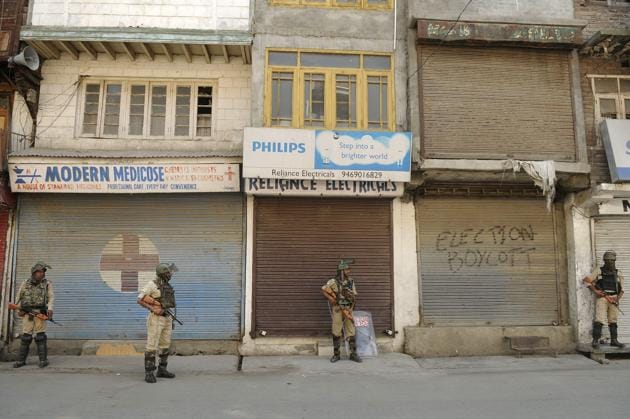Ahead of SC hearing on Article 35-A, shutdown in Kashmir, protests in Jammu
Thursday’s strike was part of a two-day shutdown called by the Joint Resistance Leadership (JRL). Protests have been held across the length and breadth of Kashmir over the past month in support of continuing Article 35-A
Kashmir valley shut down completely on Thursday in response to a call by separatists against the legal challenge in the Supreme Court on the validity of Article 35A of the Constitution while protests by various organizations including West Pak refugees, Valmiki and Gukha communities demanding immediate abrogation of Article 35-A rocked Jammu.

On Friday, the Supreme Court is scheduled to hear a bunch of petitions against the Article 35 A which empowers the Jammu and Kashmir’s legislature to define “permanent residents” of the state and provide special rights and privileges to them. Earlier this month, the state government had moved an application in the court to defer the hearing citing upcoming panchayat and urban local body elections.
Shops, business establishments and educational institutions were closed across the Valley while all kinds of transport remained off the roads due to the strike called, officials said.
Thursday’s strike was part of a two-day shutdown called by the Joint Resistance Leadership (JRL). Protests have been held across the length and breadth of Kashmir over the past month in support of continuing Article 35-A
Various organisations included Bar Association, transporters and traders’ bodies have extended support to the shutdown call of the JRL, comprising Syed Ali Shah Geelani, Mirwaiz Umar Farooq and Mohammad Yasin Malik.
In Jammu, workers of Dogra Front and Shiv Sena led by their president Ashok Gupta wore black clothes and took out a procession demanding that Article 35-A which they described as a “black law” must be revoked.
Gupta said that pressure tactics by Kashmir centric parties in the form of protests and shutdowns in Kashmir should have no bearing on the Supreme Court.
“Can Supreme Court be intimidated by few separatists and others of their ilk? I would request the chief justice of the Supreme Court to give justice Valmiki and Gurkha communities and West Pak refugees, who have been denied their fundamental rights since long,” he said.
Nearly 1.25 lakh West Pak refugees, belonging to scheduled caste and backward classes, have also pinned hopes on the apex court.
“Seventy years on our children cannot become even class IV employees in the state. We are also looking up to the Supreme Court to do away with Article 35-A so that our coming generations can become get all fundamental rights,” said Labha Ram Gandhi, the chairman of West Pak Refugees Action Committee 1947.
West Pak refugees in J&K cannot vote in Panchayat and Assembly elections. They are also not entitled for state government jobs and their children are barred from getting admissions in professional colleges.
(With PTI inputs)






